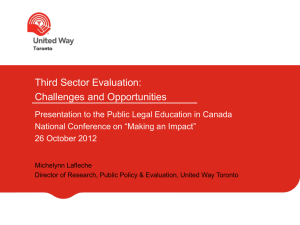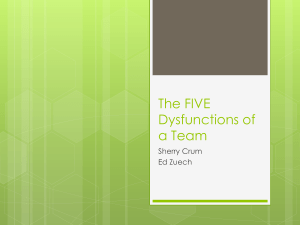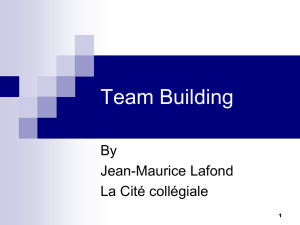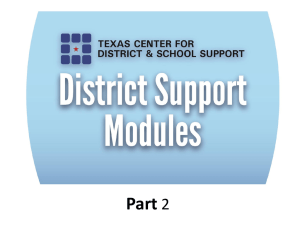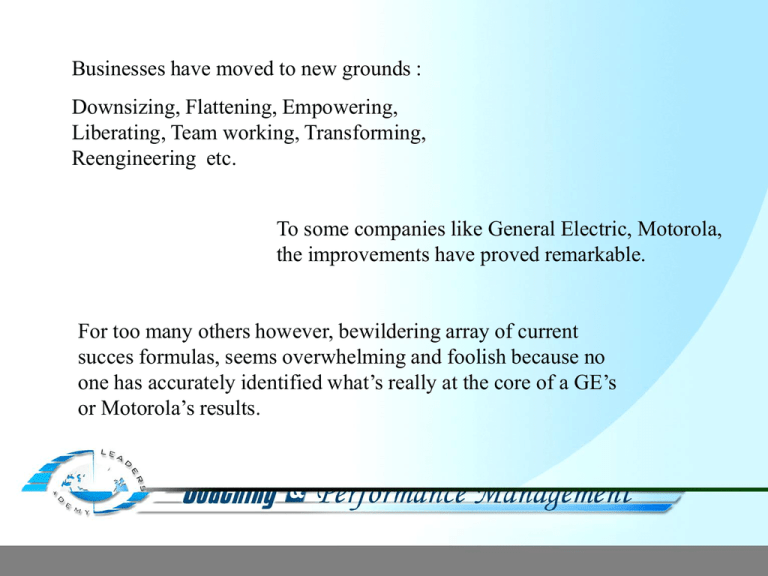
Businesses have moved to new grounds :
Downsizing, Flattening, Empowering,
Liberating, Team working, Transforming,
Reengineering etc.
To some companies like General Electric, Motorola,
the improvements have proved remarkable.
For too many others however, bewildering array of current
succes formulas, seems overwhelming and foolish because no
one has accurately identified what’s really at the core of a GE’s
or Motorola’s results.
I think any company that is trying to play in the present times,
has got to find a way to engage the mind of every single
employee.
If you are not thinking all the time about making every
person more valuable, you don’t have a chance.
What’s the alternative ?
Wasted minds ? Uninvolved peole ?
That doesn’t make sense.
- Jack Welch
®
The story of Wizard of OZ
Key Objectives Of The Training
1 Develop greater individual and
organizational accountability by
introducing a positive approach to
working Above The Line
Key Objectives Of The Training
2 Develop greater ownership
for achieving the Results
by applying the Steps To
Accountability
Activity
Result
Actions that lead to results
Desired outcomes of taking actions
Activity Versus Results
Activity
Result
• Steps that lead to an outcome
• Describes what you will ‘do’
• Some stakeholders may not
acknowledge as important
• May or may not add value
• The actual outcome
• Describes what you will ‘get’
• Meets evry stakeholder’s need
• Typically measured in terms of
inputs
• Always adds value—it’s
something everyone wants
• Objectively measured in terms
of outputs
Doing The Job
IS
Achieving the Result
Creating Accountability !!
Clarify the expected results
Link doing the job / getting results
Out of your control
Within your control
Result
Pyramid
Results
Actions
Beliefs
Experiences
Working with the Pyramid
Working with the Pyramid
These components work together
because experiences foster beliefs,
beliefs drive actions and actions
produce results
Working with the Pyramid
Working with just the top of the pyramid,
Leaders leave unchanged the things that
can be hard to change…
…but when changed, they make
the greatest impact on performance
Working with the Pyramid
To impact beliefs, Managers must
focus on creating new experiences
Every one of us is creating the culture
of this company every day. As a
Manager everything you do, everything
you say, every where you go in the
organisation leaves a footprint of the
culture of the company
Victim Cycle Assessment
NON SEQUITUR ©1996 Wiley Miller. Dist. by UNIVERSAL PRESS SYNDICATE. Reprinted with permission. All rights reserved.
“Coming home, I drove into
the wrong house and collided
with a tree I don’t have”
“A pedestrian hit me and
went under my car ”
®
Steps To Accountability Module
®
The Oz Principle
Steps To Accountability Module
See It Module
Own It Module
Solve It Module
Do It Module
BLAME GAME
STAGES OF VICTIM CYCLE
1 Ignore / Deny
• Auto Makers
• MBAs
Pretending not to know or ignoring a
problem will keep you Below the line
and impair your ability to get results
2 Its not my job
• Lack of responsibility
• Lack of desire to involve oneself
• Seek shelter from what they perceive to be
additional effort without any benefit
3 Finger pointing
People deny their poor results and seek to
shift the blame to others (don’t blame me)
eg: Herman & Miller
We need to realise that when we blame others,
we are actually giving them our permission to
have that degree of authority in our lives
-- Colin Hiles
‘ Breakthrough to Peak Performance ’
4 Confusion & tell me what to do
Response that grows :
Just tell me exactly what you want me to do ?
Willingness to change behaviour, actually transfers
responsibility to the superior
Desired response :
Here is what I am going to do, what do you think ?
5 Cover your tail
• People seek imagined protection that comes
from behaving in a Below the line manner
• Craft stories as to why they cannot be
blamed
• Documenting back up material
6 Wait & see
• Things will get better
Eg: Personal care products company
So what is the solution ?
OPPORTUNITYISNOWHERE
© 1991-1998 Partners In Leadership, LLC. All Rights Reserved.
Feel
fulfilled
Feel
Frustrated
Cover Your
Tail
5.
Wait &
See
6.
Me What
To Do
4.
Finger
Pointing
3.
Confusion & Tell
Ignore/
Deny
1.
It’s Not My
Job
2.
Cover Your
Tail
5.
Wait &
See
6.
Me What
To Do
4.
Finger
Pointing
3.
Confusion & Tell
Ignore/
Deny
1.
It’s Not My
Job
2.
Moving & staying above the line
is about impacting the situation
before it is too late
How To Recognise When You
Are Below The Line
How To Recognise When You Are
Below The Line
• You find yourself blaming others and pointing
fingers
• Your discussion on problems focuses on what you
cannot do rather than what you can do
• You spend a lot of time talking about things you
cannot change (market,field set up etc)
How To Recognise When You Are
Below The Line
• You feel you are treated unfairly, you don’t
think you can do anyhing
• You find yourself saying :
Its not my job
Let us wait and see
I can do nothing about it
Above The Line …..
Above The Line
I do model accountability and set
an example
I don’t hold others accountable
without holding myself equally
responsible
Above The Line
I do allow people to drop Below the Line
from time to time to vent their feelings
I don’t let victim stories and
Below the Line excuses go unresolved
Above The Line
I do use accountability as a way to empower
people towards results
I don’t use accountability as a hammer to
nail people when I catch them functioning
them below the line
Above The Line
I do expect people to coach me to get
Above the line when necessary
I do practice what I preach
Above The Line
I don’t get caught thinking that
accountability is something everyone
else should work on
Dictionary’s Definition
Of Accountability
“Subject to having to report,
explain or justify, responsible,
answerable ”
Dictionary’s Definition
Of Accountability
“Subject to having to report,
explain or justify; responsible;
answerable.”
Two Views Of Accountability
The Oz Principle
Accountability
Question
®
“Who is accountable
for achieving
the result?”
Before it’s
Too late
The Typical
Accountability
Question
“Who is accountable
for failing to achieve
the result?”
It’s
Too late
Accountability:
An attitude of continually asking ‘what else can I do to rise
above my circumstances & achieve the results I desire’ ?
It is the process of proactively seeing it, owning it, solving
it and doing it
It requires a level of ownership that includes making,
keeping
&
proactively
answering
for
personal
commitments
The Oz principle Definition
To take ownership for achieving results
To stay Above the line and demonstrate
Oz principle behaviors
To constantly ask, regardless of one’s
circumstances “What else can I do ?”
Flash Cards
Ashok does his job well.
Ashok does his job well.
LA training program should pay excellent results.
Ashok does his job well.
LA training program should pay excellent results.
MXL demand is low due to irregular coverage
Ashok does his job well.
LA training program should pay excellent results.
MXL demand is low due to irregular coverage
I think you can do it.
Ashok does his job well.
LA training program should pay excellent results.
MXL demand is low due to irregular coverage
I think you can do it.
Two PSOs are outstanding in your district.
Ashok does his job well.
LA training program should pay excellent results.
MXL demand is low due to irregular coverage
I think you can do it.
Two PSOs are outstanding in your district.
Fumycin is a highly effective product.
Ashok does his job well.
LA training program should pay excellent results.
MXL demand is low due to irregular coverage
I think you can do it.
Two PSOs are outstanding in your district.
Fumycin is a highly effective product.
My attitude impacts the attitude of customers.
Ashok does his job well.
LA training program should pay excellent results.
MXL demand is low due to irregular coverage
I think you can do it.
Two PSOs are outstanding in your district.
Fumycin is a highly effective product.
My attitude impacts the attitude of customers.
With outside music system blaring, there was
disturbance.
®
See It Module
Accountability behaviors
See It
Obtaining the perspectives of others
Asking for and offering feedback
Being open and candid
Hearing the hard things
Others perspectives -- WHY ?
Asking for and Providing
feedback
Feedback creates accountability
• Betty Bingham
Clean up operation
One of the VPs
Change in perception
Being open and candid
Hearing the hard things
Green Dart …
Accountable
people
Seek
Create
Feedback
Feedback
Significance !!
What Feedback Do You
Have For Me?
DO YOU HAVE ANY FEEDBACK ?
Thanks for the feedback
Feedback Filters
You are not my Boss !!
He is new around here
Why should I listen to him, he does not do it either
HO people donot understand how things are in the field
It cannot be so
etc etc…
Feedback Filters
Lots of Feedback
Feedback
Very Little
Feedback
Feedback
What Feedback Do You
Have For Me?
Thanks for the feedback
Thanks
for the
feedback !
®
Own It Module
Culture of accountability
1. Read it
2. Commit it to memory
3. Count the number of
1 minute
F
A Culture of Accountability is
built upon the foundation of
effectively using each of the
Steps To Accountability to
facilitate a focus on results in
the face of frustrating
obstacles
®
A Culture of Accountability is
built upon the foundation of
effectively using each of the
Steps To Accountability to
facilitate a focus on results in
the face of frustrating
obstacles
®
A Culture of Accountability is
built upon the foundation of
effectively using each of the
Steps To Accountability to
facilitate a focus on results in
the face of frustrating
obstacles
®
Accountability behaviors
Own It
Being personally invested
Acknowledging my involvement
Creating & maintaining alignment
Owning personal & team objectives
Ownership is:
The ability to tie where I am
and what I have done
and
where I want to be and what
I am going to do
Making The Tie
If you can’t make the tie,
you don’t Own It!
Temporary job
Owning It
Ask yourself the question
“What else can I do to rise above my
circumstances and get the results I want ?”
Making The Tie
“If you’re not part of the
solution, you are part of the
problem”
“If you’re not part of the
problem, you’re not part of the
solution”
Levels Of Ownership
Agree
Involved
Buy-In/Invest
Disagree
Involved
Comply/Concede
Agree
Uninvolved
Exempt/Excuse
Disagree
Uninvolved
Resist/Resent
Holding People Accountable
1. Be careful not create a tell-me-what-to-do
attitude in the person you are holding
accountable
2. Avoid solving the problem for them by encouraging
them to find solutions and identify next steps
3. Encourage them to take accountability for
achieving the results
4. Don’t change clearly stated expectations (because of
a good story) maintain accountability even in the
face of Below the Line behavior
Holding People Accountable
5. Establish an environment where feedback and
coaching is sought and freely exchanged
6. Be clear that they need to provide solutions rather
than you
7. Be positive by avoiding lecturing, threatening,
and criticizing people into sharing ownership
8. Be specific in terms of when they will proactively
report back
Examples : Below The Line ...
“Since there are more than 15
generics of fluconazole, I don’t think
doctor will listen to my detailing of
Fumycin”
“The vending machine has more
options than me”
“I think accountability is on the
third floor”
®
Solve It Module
Accountability behaviors
Solve It
“What else can I do?”
Actively redefining boundaries
Creatively dealing with obstacles
Staying focused on results
LIFT Accountability
Coaching Model
LIFT Accountability Coaching Model
The model is used to lift people who are stuck below the line
Clearly define the result not being achieved.
Ask the the question :
“Why aren’t you making the progress
that you really want to make ?”
LIFT Accountability Coaching Model
Listen for obstacles:
What else is getting in the way
of making progress?
LIFT Accountability Coaching Model
Identify obstacles you can
influence:
“Which of these obstacles do
you most need to overcome,
and why?”
LIFT Accountability Coaching Model
Facilitate the Solve It
question:
“What else can you do?”
‘Solve it’ Self assessment, Pg. 36
LIFT Accountability Coaching Model
Test for movement:
“What action are you going
to take ?”
LIFT Accountability Coaching Model
If no movement, ask:
“Are you accountable to achieve result”
“ What will happen if you don’t achieve it”
(You may need to use leverage to help LIFT them
above the line)
Keys to creating leverage
If you had to take accountability for
overcoming one of these obstacles,
which would it be? Why?
If your life depended on it, what else
would you do?
LIFT Role Play
* What went well
* What did not go well
What mistakes can happen while
Coaching someone for above the line ?
What mistakes can occur while using
the LIFT Model ?
Listen more / its never enough
Do not solve the problem for them
Do not ever get to determining concrete
actions
Listen for obstacles
Identify obstacles you can influence
Facilitate the Solve It question
Test for movement
®
Do It Module
Despite the many benefits that
accrue from applying the other
three steps, results only come
when you pull all four steps
together and DO IT
Doing it requires that you
continuously stay Above the line
Accountability behaviors
Do It
By reporting proactively
Relentlessly following-up
Doing the things I say I’ll do
Measuring my progress toward
achieving intended result
Do It Definition
SM
I am accountable to Do It by
reporting proactively, relentlessly
following up, doing the things I say
I’ll do, and measuring my progress
toward achieving the intended result
Creating Accountability
Clarify the expected results
Link doing the job / getting results
Creating Accountability
Why people fail to do it ?
Gravitational pull ?
Victim cycle ?
The Oz Principle
Cultural Transition:
Changing the ways we think about
how we do business and adopting
corresponding changes in actions
Joint Accountability …
R
R
R
Joint accountability
R
R
R
The Oz Principle
“ Only when you assume full
accountability for your thoughts,
feelings, actions, and results can
you direct your own destiny;
otherwise, someone or something
else will ”
Four Kinds Of People
People who make things happen
People who watch things happen
People who wonder what happened
People who never knew anything
happaened
The Oz Principle
Culture Of Accountability:
is defined as people being accountable to
think and act in the manner necessary for the
team to achieve results
The Oz Principle
Culture does impact results
Leaders can manage effective culture
Culture produces results, results create culture
Result
Pyramid
Results
Actions
Beliefs
Experiences
Clarify the expected results
Link doing the job / getting results
Keep your face to the
sunshine & you will not
see the shadows
Helen Keller






